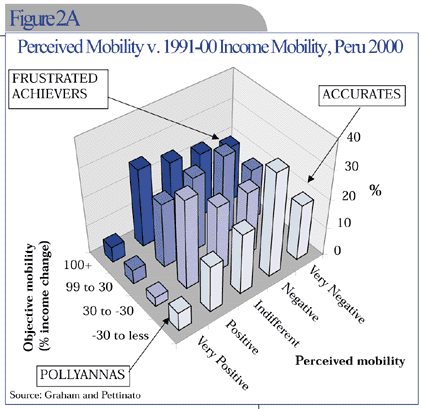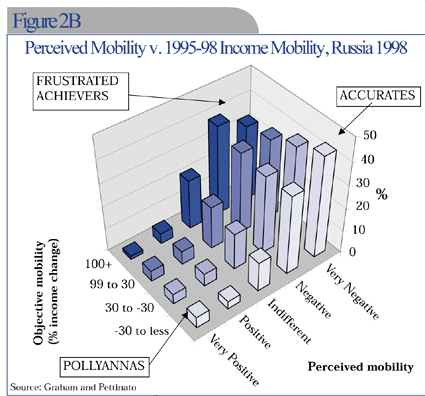What do these frustrations imply? In a Latin American public opinion survey, the Latinobarometro, we found that respondents who were more satisfied with their lives were more likely to favor the market and to be satisfied with democracy. The surveys in Russia yield similar results. In both Russia and Peru, the frustrated achievers were less satisfied with their jobs and more critical about their economic situation as compared to others in their country.
Given that these people participate economically and politically, their frustrations should give policymakers some cause for concern. We posit that the frustrations of achievers are driven by reference norms (which are clearly affected by top-driven inequality), and insecurity (such as fear of unemployment), as well as by differences in individuals' psychological make-up, which policy can do nothing about. Therefore, at least part of the solution lies in creating more widely shared opportunities for upward mobility, and part lies in reducing or managing macroeconomic volatility and reforming labor markets and social insurance systems.

Advertisement
Policies to Enhance Opportunity and Reduce Insecurity
There are three sets of policies which could reduce insecurity and enhance the upward mobility of both the middle strata and the poor in the emerging market economies. The first and most obvious way to enhance the mobility and opportunity of both poor and middle-income people is to improve access to better quality and higher levels of education (beyond secondary). While the long-term benefits of such a policy shift are evident, it will take a long time before it yields results, as well as sustained political commitment, institutional development, and substantial resources to implement and sustain it.
A more comprehensive social contract for the delivery of essential social services is fundamental to delivering better education. There is widespread debate about the merits of targeted versus more widely available social welfare policies in the advanced economies, for example, with those in favor of the latter arguing that tightly targeted policies cannot sustain the political support necessary to preserve their public funding.

In the developing economies, the increased targeting of public social expenditures that accompanied the turn to the market in many countries has been very effective at reducing absolute poverty, particularly at times of fiscal austerity. At the same time, globalization-related shifts in the rewards to different education and skill cohorts, coupled with the shrinking size and scope of public services, has led to a perception and often a reality of increased insecurity for middle and lower income groups. At least some targeting is desirable in most contexts where public resources are limited. Policy must aim towards crafting a broader and more politically sustainable social contract that includes middle income groups as well as the poor.
In addition to supply-side policies, there must be an effort to address demand. A wide body of literature—including articles by Steven Durlauf of the University of Wisconsin and George Akerlof of UC Berkeley and Brookings—addresses the perpetuation of inequality by persistent social norms, identity, and low expectations. In some societies, where the poor lack a tradition of attaining higher education, there is a role for policies to educate and encourage low-income people to make new kinds of investments in their children's future. My earlier works suggests that the poorest are the least likely to participate in reforms such as vouchers in education and privatized social security due to transaction costs, the opportunity costs of their time, and low expectations.
Advertisement
The second set of policies must address existing distortions in markets and failures in government policies. Many countries in the developing world, particularly in Latin America, have made major strides in improving their macroeconomic frameworks. Yet, as in the case of improving education systems, removing distortions alone is not enough. If, as in some countries, poorly performing public monopolies are merely replaced with private ones, the outcome is likely to be persistent or even increased inequality, and few, if any, new opportunities for the poor or near poor. Adequate regulatory policies, which level the economic playing field for all participants, are essential. The same policy package should also address the issue of inequality. The high costs of excessive concentration of income and assets for economic growth have been well-documented elsewhere. Our results suggest that high levels of inequality have additional costs in that they create an unachievable reference bar which frustrates even the most upwardly mobile individuals. These frustrations, in turn, may erode political support for the kinds of market-enhancing policies that deliver sustained growth and poverty reduction.
A third proposal that is essential to enhancing both opportunities and public perceptions of the existence of those opportunities is providing adequate safety nets, both for those who take risks to get ahead and run into trouble, and for those that fall behind because they are unable to take up new opportunities. The absence of adequate insurance mechanisms can result in market distortions, as those who are employed seek to minimize risk and guarantee employment security through whatever mechanisms are available, even though they may be extremely inefficient (such as excessively rigid labor laws). In addition, insecurity caused by weak insurance mechanisms in the face of volatility is certainly one of the factors that drives our achievers' frustrations.
Two kinds of safety nets are necessary. One is unemployment insurance, which allows workers to take risks by protecting them from unexpected income changes due to macroeconomic volatility and other exogenous shocks. The second safety net must address the needs of those who fall behind, either because of low skills or other barriers to their participation in the low-skilled sector of the economy. Past attention to this issue, such as my own earlier work, has focused on fiscal adjustments. More recently, Nora Lustig has emphasized the need for more permanent safety nets that can expand and contract as needed, and provide a buffer at times of cyclical fluctuations and/or during downturns. Finally, policymakers must explore new and better ways of managing macroeconomic volatility.